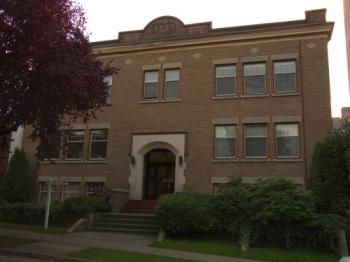Housing advocates claim landlords are exploiting a provision in the B.C.’s Residential Tenancy Act that allows them to evict tenants for renovations and then hike the rent. Landlords maintain they are serving tenants’ interests by keeping the buildings in good repair.
Tenants in some buildings are banding together to fight the evictions, including those at the Seafield Apartment complex in Vancouver’s West End, where tenants in a number of buildings are facing renovation evictions.
Seafield tenants were told they had to move out to make way for renovations that include plans to add new kitchen counters and cabinets, rewire the building and install metered electric heating in suites.
But the residents say the building was well maintained by the previous owner and doesn’t need major renovations. Gordon Nelson Investments Inc. bought the 77-year-old building in July.
“They initially told us they’d renovate the building as there are safety issues. Our position is that we will accommodate renovations – we’re just not going to permit that as an excuse to kick out the residents and jack up the rent.” says Tim Pawsey, who has lived at Seafield for over 30 years.
At a meeting with the new owners in early fall, Pawsey says, the tenants were told point blank they would not be able to afford to live there after the renovations were completed. When asked for an interview, a Gordon Nelson spokesperson said the company would not comment at this time.
Tenants’ rights group Renters at Risk has said there are about 30 apartment buildings in Vancouver whose tenants have been evicted for renovations. Many fear that with the 2010 Olympics only a year away, the trend will escalate unless current legislation is changed.
With Vancouver already experiencing a severe shortage of rental housing, renovation evictions became an issue during the recent municipal elections.
{xytpo_quote} “I wanted to be sure that people in Vancouver, as well as people across Canada and the world, had access to information about what’s happening in the rental community in Vancouver.” {/xytpo_quote}
Last week, city councillor Tim Stevenson said he will propose a motion asking the provincial government to amend the Residential Tenancy Act to allow renters to have “right of first refusal” which would give renters the option to return to their units after renovations are completed.
He also wants the Residential Tenancy Office in the West End re-established and the period of time for notice of evictions lengthened from 60 to 90 days.
Stevenson’s right of refusal proposal is similar to legislation in Ontario, which enables tenants to return to their apartments after renovations without paying significantly higher rent.
However, the B.C. Apartment Owners and Managers’ Association and the Rental Owners and Managers Society of British Columbia have said such legislation could mean that buildings simply don’t get renovated and lead to the deterioration of older buildings.
Tom Durning of TRAC (Tenant Resource & Advisory Centre) believes that property companies are largely to blame as they’ve been purchasing buildings that are currently being rented under market value with the specific goal of evicting tenants and increasing the rent.
Given the current regulations, there isn’t much those faced with eviction can do except go their residential tenancy branch,” says Durning.
“The Seafield apartment situation is not unlike others all over the province and every one of those tenants should dispute those eviction notices. Unfortunately they have to go individually to the residential tenancy branch because it has ruled that every case is different.”
Seafield residents, some of whom have lived in the building for decades, are a tight-knit community and dread the thought of no longer being neighbours if the evictions are carried out.
Not to mention the chore of looking for a place to live with the vacancy rate in Vancouver at a mere 0.3 per cent, according to figures just released by the Canada Mortgage and Housing Corporation.
While Melissa Medwell is one of Seafield’s newer residents, having moved in just two weeks before it was bought by Gordon Nelson, she says she’s determined to keep her home and fight for the rights of others facing the same problem.
To that end, Medwell founded a website dedicated to raising awareness of the plight faced by both the residents of Seafield and numerous others throughout the city.
“I wanted to be sure that people in Vancouver, as well as people across Canada and the world, had access to information about what’s happening in the rental community in Vancouver,” she said.
“Really, it’s foreigners and Canadians that aren’t from Vancouver who are the customers of these renovicted suites – they just don’t know better than to rent an apartment for twice what it went for before the evictions and renovations.”




